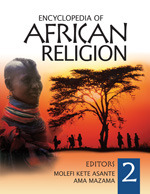Encyclopedia of African Religion
- Molefi Kete Asante - Temple University, USA, Associate Professor, School of Journalism & Communication, University of Queensland
- Ama Mazama - Temple University, USA
Features include:
it helps readers grasp the enormity of Africa's contribution to religious ideas by presenting richly textured concepts of spirituality, ritual, and initiation while simultaneously advancing new theological categories, cosmological narratives, and ways to conceptualize ethical behavior
it provides readers with new metaphors, figures of speech, modes of reasoning, etymologies, analogies, and cosmogonies
it reveals the complexity, texture, and rhythms of the African religious tradition to provide scholars with a baseline for future works.
"This volume is significantly more comprehensive than the relevant sections of S. Glazier’s Encyclopedia of African and African-American Religions (Routledge, 2001). Articles range from broad essays such as “Creation,” “Rites of Passage,” and “Circumcision” to shorter entries on topics such as the Pocomania religion, sangoma (a type of Zulu healer), and the Yoruba deity Ifa. There are numerous articles on the religious traditions of specific groups, as well as articles on important individuals. The religious traditions of the African diaspora, such as Santeria and Vodou, are also covered. The information is generally accurate and clear. A short bibliography follows each of the signed articles, as do cross-references, though sometimes these are inadequate. A reader’s guide lists the articles by type, and the helpful appendix lists the names of God used among different groups. Full access will be impeded by the author’s occasional use of the African form of Egyptian gods’ names, rather than the more familiar Greek forms. For example, there is no reference to Osiris, who appears here under the name Ausar, and although there is an article titled “Thoth,” his name in other articles becomes Tehuti, with no explanation. The black-and-white illustrations are sporadic, but adequate. Overall, because of its singular focus, reliability, and scope, this encyclopedia will prove invaluable where there is considerable interest in Africa or in different religious traditions."
–Sue Giffard, Ethical Culture Fieldston School, New York City

